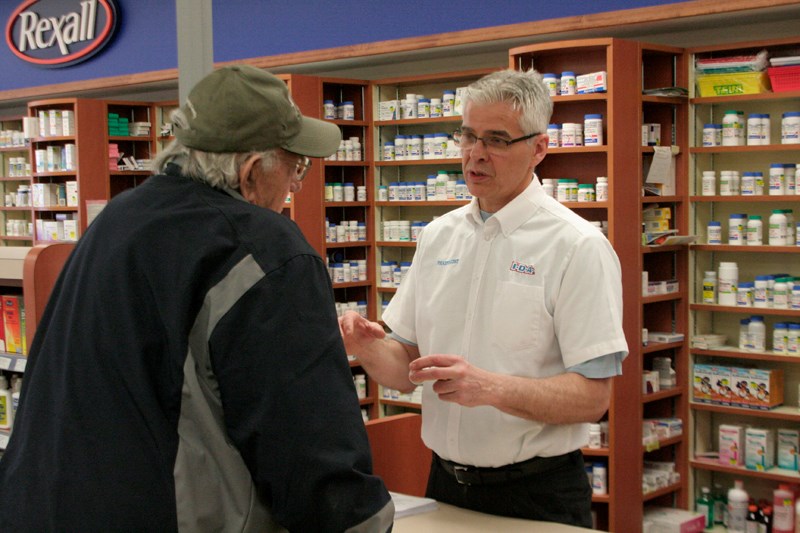Pharmacies across Alberta participated in a provincewide rally last week to protest cuts to generic drug prices.
Many rural pharmacies chose to close their pharmacies for a few hours on April 11 to highlight how much the cuts hurt their bottom line as rallies took place in big cities. In Innisfail, local pharmacist Clark Jantzie kept Parkland Pharmacy I.D.A. open for retail business on Thursday but used the time between 10 a.m. and 1 p.m. to engage with customers about the issues and collected names on a petition to be forwarded to the local MLA.
As of June 1, generic drug prices will drop to just 18 per cent of what their brand name counterparts are worth, down from 35 per cent. This combined with declining revenues over the past few years will result in a decline of services for the consumer including the loss of one-on-one time with pharmacists, delivery of prescriptions, drug shortages and increased wait times, pharmacists say.
While lower drug prices will appeal to the average consumer, it seriously affects revenue flows that pharmacies used to provide services in their community, Jantzie said.
“This change is really significant,” he said.
The major source of revenue for pharmacists comes in the form of dispensing fees, which have essentially been at the same level since the 1990s, he explained. It means pharmacists have had to rely on other means to cover the costs associated with inflation.
Jantzie said pharmacists want lower drug prices for their customers but said the government should reinvest savings back toward the industry. He said the goal of the provincewide rally was to put pressure on the government to work with the Alberta Pharmacists' Association to find mutually beneficial solutions.
The Alberta Pharmacists' Association said that as the government reduces generic drug prices the potential for drug shortages increases. Because generic drug companies are global and because there is only so much active ingredients available it only makes sense that manufacturers will ship their supply where they will enjoy the greatest returns and Canadian manufacturers will be forced to go offshore to decrease costs. This will challenge the integrity of supply, the professional association said.
Just a day before the pharmacists' provincewide rally last week, the province announced support measures that would come as a result of lower generic drug prices, including $500,000 to the Alberta Pharmacists' Association to train pharmacists in delivering front-line care, compensation criteria for delivering front-line services, a 30-day delay to introduce the reduced generic drug prices (originally planned to take effect May 1), the reinstatement for one year of a $1 per prescription allowance meant to help pharmacies transition and a $10.6 million remote pharmacy access grant.
“Pharmacists are vitally important health-care professionals, and these new supports will help them transition through this necessary change,” Minister of Health Fred Horne said in a statement. “By lowering the cost of generic drugs, Albertans will pay less for their medication and Alberta will have more funding available to improve our health-care system. We are committed to reducing generic drug prices.”
But the Alberta Pharmacists' Association said it has previously rejected the above measures.
“Pharmacists have dedicated their professional careers to helping patients, but government continues to make decisions that will limit the ability of pharmacists to care for Albertans,” association president Byron Bergh said. “Real change is required to support pharmacists in delivering patient care. It has been over 20 years since government has made meaningful changes to the fees that pharmacies are paid for their dispensing services and this generic pricing reduction will make the practice of pharmacy very difficult.”
Innisfail-Sylvan Lake MLA Kerry Towle said everybody wants lower drug prices, but said the province's plan will have three serious negative impacts. First, drug companies will stop manufacturing generic drugs, she said. Second, pharmacies will go out of business. Finally, drug shortages will occur.
“We absolutely want lower drug costs, but the way this government is going about it, the implementation of what they are trying to do is really negative,” Towle said. “They are not working with pharmacists to get there, which is what they've always done in the past.”
The government should work more co-operatively with the Alberta Pharmacists' Association moving forward, she said.



